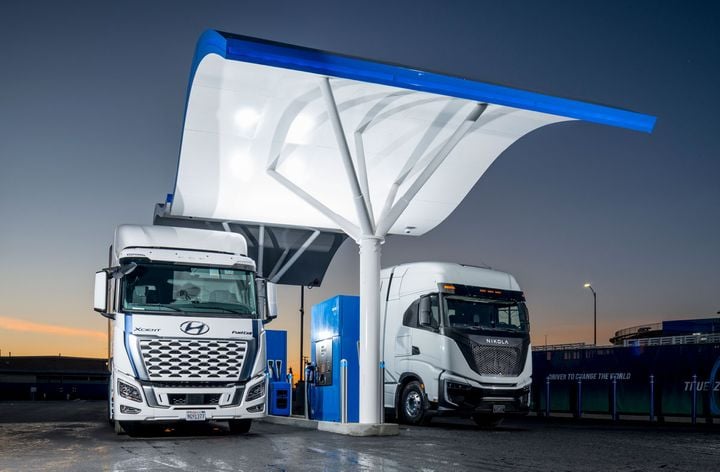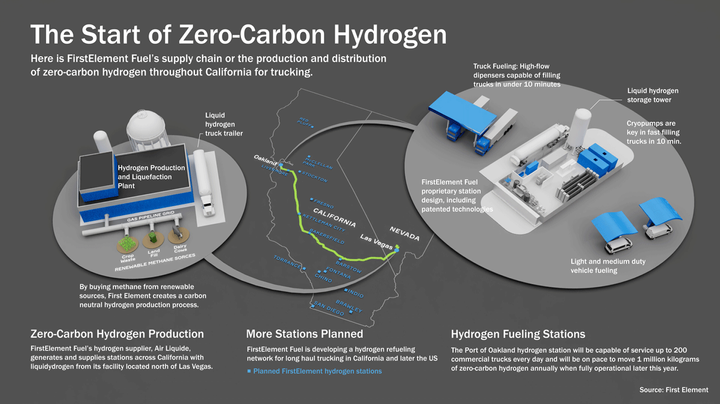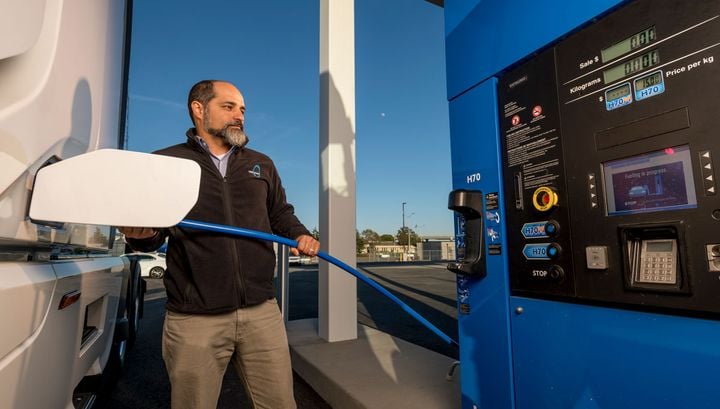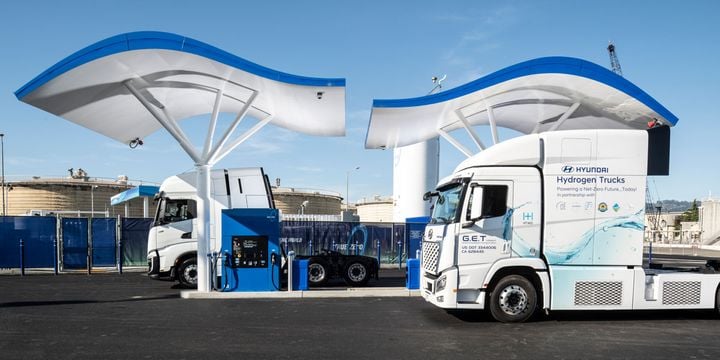Trucker Access › Forums › Diesel News › High-Capacity Hydrogen Truck Fueling Station Opens in Oakland, California – Fuel Smarts
- This topic has 0 replies, 1 voice, and was last updated 11 months ago by
 EazyRiDer66.
EazyRiDer66.
-
AuthorPosts
-
May 4, 2024 at 11:28 pm #18231
 EazyRiDer66Keymaster
EazyRiDer66Keymaster

Hyundai and Nikola have committed approximately 90 trucks to use the station regularly, and a number of truck manufacturers are expected to add to the growing fleet of hydrogen-powered, fuel cell trucks.
Photo: First Element Fuels
The new FirstElement Hydrogen Refueling Station in West Oakland, California, is using new technology that allows fueling of hydrogen-fuel-cell trucks in about the same amount of time it takes to refuel a diesel truck.
It’s the country’s first commercial hydrogen truck stop, according to FirstElement Fuel, and the largest in the world. It potentially triples the amount of hydrogen used in on-road transportation today.
The station will be able to support up to 200 trucks and back-to-back refueling.
It’s designed to move up to 18,000 kilograms of hydrogen daily and 6.3 million kilograms of hydrogen annually. In comparison, all of the hydrogen passenger vehicles in the United States consumed approximately 2 million kilograms of hydrogen in 2023.
Hyundai and Nikola have committed approximately 90 trucks to use the station regularly, and a number of truck manufacturers are expected to add to the growing fleet of hydrogen-powered, fuel cell trucks.

The Port of Oakland station is the first of 15 hydrogen truck stations FEF plans to open in California to create a hydrogen infrastructure along major trucking routes.
Photo: First Element Fuels
New Cryo-Pump Hydrogen Fueling Tech
Shane Stephens, FEF co-founder and chief development officer, credits a collaboration with automotive supplier Bosch for creating a new “cryo-pump” that will enable the company to pump hydrogen at 10 times the capacity of current methods.
“It’s a game-changer,” Stephens said in a news release. “This liquid hydrogen pump developed between Bosch-Rexroth and FirstElement Fuel represents a leap forward in the ability to efficiently and economically fill hydrogen-powered vehicles at this scale. And it’s being done in collaboration with a company that knows how to manufacture equipment for the trucking industry.”
The Port of Oakland station is the first of 15 hydrogen truck stations FEF plans to open in California to create a hydrogen infrastructure along the major trucking routes. Plans are underway to open two more stations in California next year.

First Element Fuels says new tech developed with Bosch allows hydrogen refueling in 10 minutes.
Photo: First Element Fuels
Hyundai Xcient FCEVs and NorCal Zero
The Hyundai trucks are part of a program called NorCal Zero, a project bringing zero-emission freight transportation to the Bay Area and Central Valley.
It’s a $53 million collaborative effort to deploy 30 of Hyundai’s Class 8 Xcient Fuel Cell electric trucks, supporting Hyundai Motor’s entry into the U.S. market for Class 8 hydrogen fuel cell electric trucks. Hyundai unveiled the truck for the North American market at last year’s ACT Expo.
According to the Center for Transportation and the Environment, the NorCal ZERO project has the potential to avoid 24.4 metric tons of carbon-dioxide emissions, equivalent to 2.4 million gallons of diesel consumed, over the six-year operation of these trucks.

GET Trucking will be fueling 30 Hyundai Xcient Fuel Cell trucks at the First Element Fuel hydrogen refueling station.
Photo: First Element Fuels
GET Freight, the trucking subsidiary of Glovis America, is operating the Hyundai Xcient hydrogen-fuel cell trucks, hauling containers from the Port of Oakland and cars from the Port of Richmond.
The trucks will provide Glovis with a total cost of ownership over six years that is nearly equivalent to the ownership cost of Glovis’ diesel trucks, with cost savings thereafter, according to an announcement.
Glovis America was founded by people from the logistics departments of Hyundai Motor America and Kia Motors America who wanted to improve the efficiency of their auto supply chains. In 2019, the company expanded its U.S. footprint by launching GET, Global Expedited Transportation, which transports finished automobile parts by truck.
[embed]https://www.youtube.com/watch?v=P8sJ-d6PVgE[/embed]
The trucks, which have a range of more than 450 miles on a single fill of hydrogen, have primarily operated in drayage service, hauling freight and cars to destinations in the Bay Area and the Central Valley.
Papé Group maintains the trucks at its San Leandro facility, where technicians receive in-depth training from Hyundai on how to service the trucks. With engineering and design support from the Fiedler Group, Papé Group also upgraded its maintenance facility with hydrogen detection and ventilation equipment to safely service the trucks.
[embed]https://www.youtube.com/watch?v=KksQUbzoSpo[/embed]
It Takes a Village to Decarbonize Trucking
The dedication event demonstrated the array of government and private partners it will take to decarbonize heavy-duty trucking:
- FirstElement Fuel
- Hyundai Motor
- The Center for Transportation and the Environment
- Glovis America
- East Bay Municipal Utilities District
- Papé Group
- The University of California
- The Port of Oakland
- The City of Oakland and the community of West Oakland represented by the West Oakland Environmental Indicators Project (WOEIP).
- The Alameda County Transportation Commission
- The Bay Area Air Quality Management District
- The California Air Resources Board
- The California Energy Commission
- The University of California Berkeley and the West Oakland Environmental Indicators Project are assisting with data collection, community outreach efforts, and communication.
The project is funded in part with $11.98 million from CARB’s California Climate Investments Program, $9.89 million from the CEC’s Clean Transportation Program, $3.64 million from Alameda CTC’s Clean Freight Program, $3.36 million from BAAQMD, and $24 million from project partners.
“This project is a true trailblazer on so many levels, and a head start on the future we plan to build through the Alliance for Renewable Clean Hydrogen Energy Systems (ARCHES) federal hydrogen hub,” said Tyson Eckerle, senior advisor for clean infrastructure & mobility at the California Governor’s Office of Business and Economic Development.
-
AuthorPosts
- You must be logged in to reply to this topic.